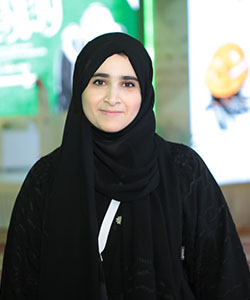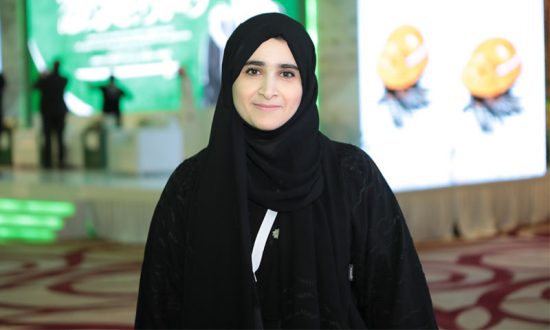Dr Tahani I. Aldosemani is an associate professor of Educational Technology at Prince Sattam bin Abdulaziz University and a former vice dean of Information Technology and Distance Education at the same university. She has a PhD in Educational Technology from the University of Wyoming, USA, and she is a member of multiple educational technology associations such as AECT and ICEM. Dr Tahani was a member of multiple educational national and international professional associations.
Education and lifelong learning are considered as the foundation for economic sustainability, social growth, and upon which nations’ strategies, policies, and directions are based. Building a knowledgeable society is essential for creating jobs, improving standards of living, and becoming more competitive as a nation. The impact and contribution of the wealth of knowledge were perceived and appreciated in various sectors and disciplines and recognised in all regions around the world including Middle Eastern and North Africa (MENA) countries’ were investments have been allocated to sectors such as education, research development, and innovation. This resulted in increased attention being paid to these sectors compared to past decades, and more concrete achievements have been realised in recent years. Furthermore, with a globalised economy and an increasingly internationalised labour market, the need for an educated and skilled workforce in the MENA region is arguably greater than ever before. Due to the perceived benefits of higher education in leveraging knowledge ecosystem, economic development, and societal growth, the MENA region carried out various initiatives that played a significant role and led to substantial changes, creativity, innovation, and progress. However, the futuristic demands of the 21st century, geopolitical factors, along with COVID-19 pandemic impact all put their imprint on all facets of life and triggered radical change and disruption in higher education sector both domestically and internationally. Therefore, reform opportunities can be advanced to ensure the quality of higher education, which include internal inputs into the educational process and other key factors which require synergies with the local community, labour market, and other stakeholders.
Higher education institutions in the MENA region can recreate long-term vision to support reacting skillfully and strategically to global changes and challenges. The vision of the institution reinforced with its mission and the planned route to realising the vision should align with the overall national goals to ensure their relevance and impact in promoting educational and societal outcomes. Additionally, institutions can reconsider their business models to develop agile financial systems, flexible admission and registration procedures, improved students’ progression and graduation rates. Higher Education business models need to be developed according to sustainable funding strategies for their activities. They need to experiment with increases in cost-sharing and improvements in needs-based assistance. In the higher education environment, closer interactions between the education sector and the business sector are increasingly important. Universities should explore potential channels for expanding partnerships with the private sector in areas such as internships and co-op training opportunities. Ensuring greater autonomy and independence for higher education institutions will enhance their effective responsiveness to the 21st-century job market demands. It will ultimately foster innovation and strategic thinking, which will elevate higher education contribution to societies and economies. Furthermore, higher education institutions should focus future efforts on creating various specialisations and diversifying institutional services such, providing various vocational and technical training fields leveraging community colleges and research universities’ roles. Besides, higher education institutions should adopt effective institutional governance models that are based on transparency, accountability and established according to openness to data collection, evaluation, and assessment standards to facilitate monitoring institutional performance and progress.
Effective institutional governance can provide strategic vision for strengthening the partnership and cooperation between universities and will help to advance the linkage between market forces and higher education. Further, higher education institutions processes can be promoted through the implementation of internal structures for quality assurance and accreditation through the application of best practices of data and information collection on students’ admission, and entry and graduation rates, to assess their progress and benchmark results. Embracing a culture of evaluation and self-evaluation through the adoption of effective mechanisms and measurement systems for monitoring and evaluating tertiary education outcomes such as programs, faculty, and educational outcomes will inform decision making and leverage institutional transparency. Also, higher education institutions need to invest in teachers’ professional development programs to upskill and reskill in-service and preservice teachers and improve the quality of recruitment processes and enhance the perception of teaching as a profession.
Another opportunity for higher education institutions in the region to lead reform and infuse change is by reinventing the academic year by creating a year-long academic programme combining the best of in-person and online learning. It is expected that COVID-19 may internationally accelerate the end of the traditional semester-based system for collegiate registration, progression and graduation, because current and future students are used to being online all the time considering that remote learning is redefining the relationship between educators and students and students and their courses. Additionally, the academic year can be tailored to students’ needs providing them with the opportunity for personalised year-long academic programme that will contribute in reducing attrition and transfer rates which will have financial return and investment for the institution.
Indeed, higher education enrollment and admissions systems should move toward a more flexible and student-driven system where students can choose where and what they study, and institutions can begin to manage their academic and operational affairs. Higher education institutions need to enhance secondary school graduates’ preparedness for university through the development of admission procedures utilising specialised exams that assess language abilities and reasoning and thinking skills. Moreover, the linkage between education and employment needs to be strengthened. This can be achieved through exposing students to real-world situations, internship programs, opportunities and advisory councils for business and industry and consider private sector’s input in the discussion of curriculum design, educational planning and degree requirements including the quality of teaching and curriculum in vocational training schools. These linkages are critical to the task of supporting broader societal goals and needs, fueling the creation of knowledge, advancing research, and educating a new generation of leaders able to engage in the global knowledge economy.
In sum, universities have a critical role to play in society as a producer of human capital and a creator of knowledge for broader dissemination into society. The university’s role in society has become more crucial as regional economies have moved away from state-run models, and as the global shift to a knowledge-based economy has put higher premiums on tertiary education and human capital. Supporting broader societal goals, fueling the creation of knowledge, advancing research, and educating a new generation of leaders able to engage in the global knowledge economy are among the most important building blocks of reform in higher education. Comprehensive reform of the higher education system is needed to address the skills gap, fuel economic development, and put the region on a distinguished position for advancement and competition in a technologically driven, knowledge-based world.
About Dr Tahani I. Aldosemani

Dr Tahani has received several international awards and recognitions in E-learning and educational research and has many publications in Educational Technology. She implemented many successful initiatives in education, presented at many conferences and seminars, trained in many webinars and workshops on technical and soft skills. Dr Tahani designed a curriculum for autodidactic learning of soft skills through Massive Open Online Courses MOOCs. She also contributed as a reviewer for prestigious international journals and conferences and works as a Senior Consultant at the Saudi Ministry of Education and Education and Training Evaluation Commission in Saudi Arabia.




